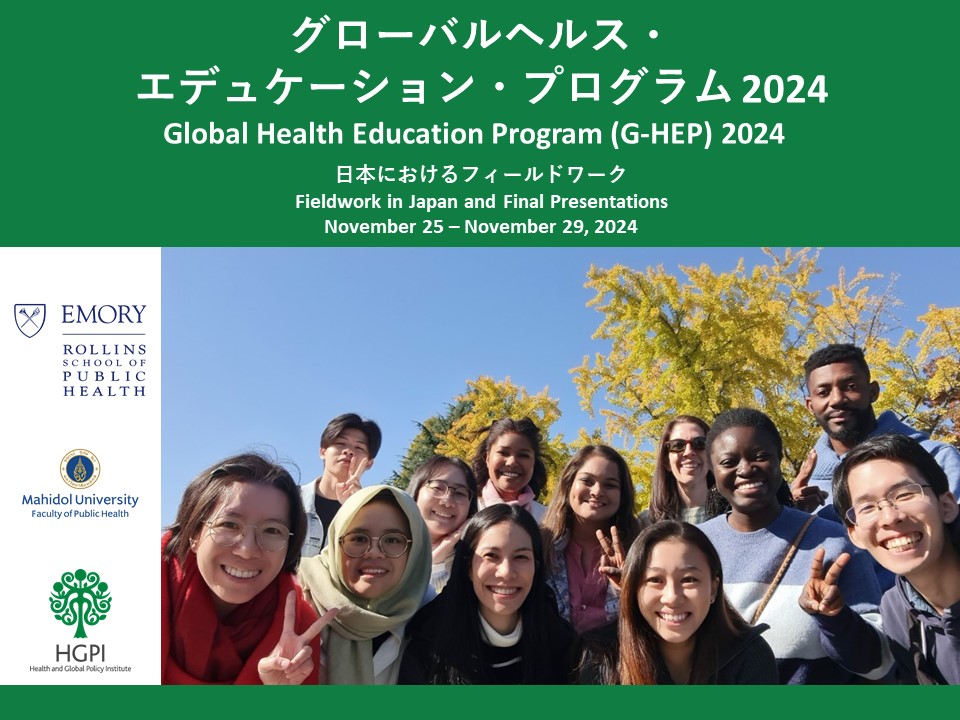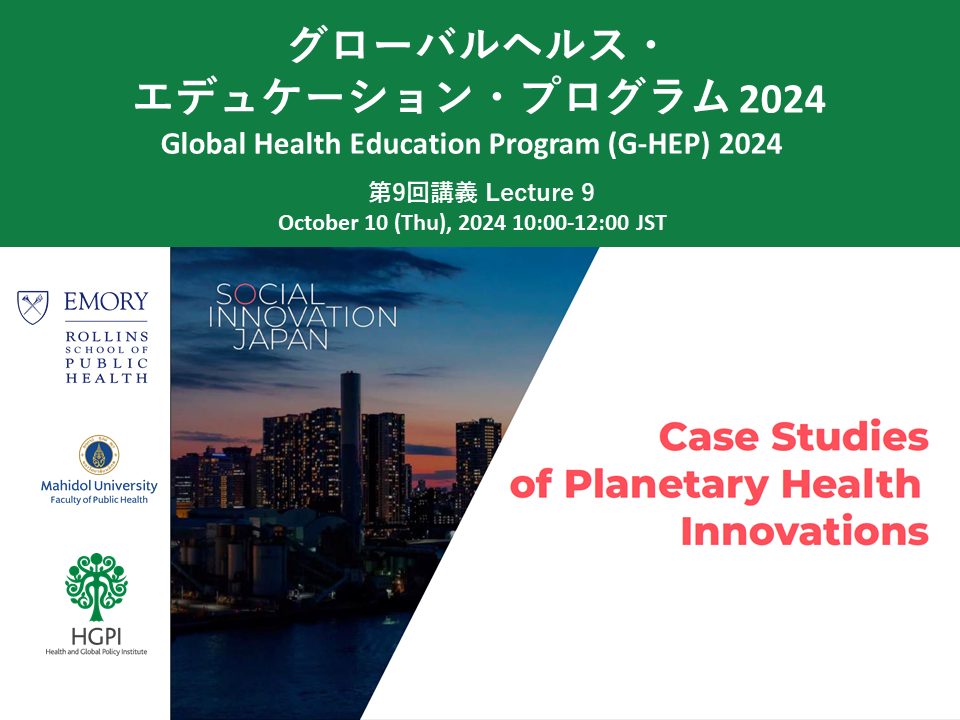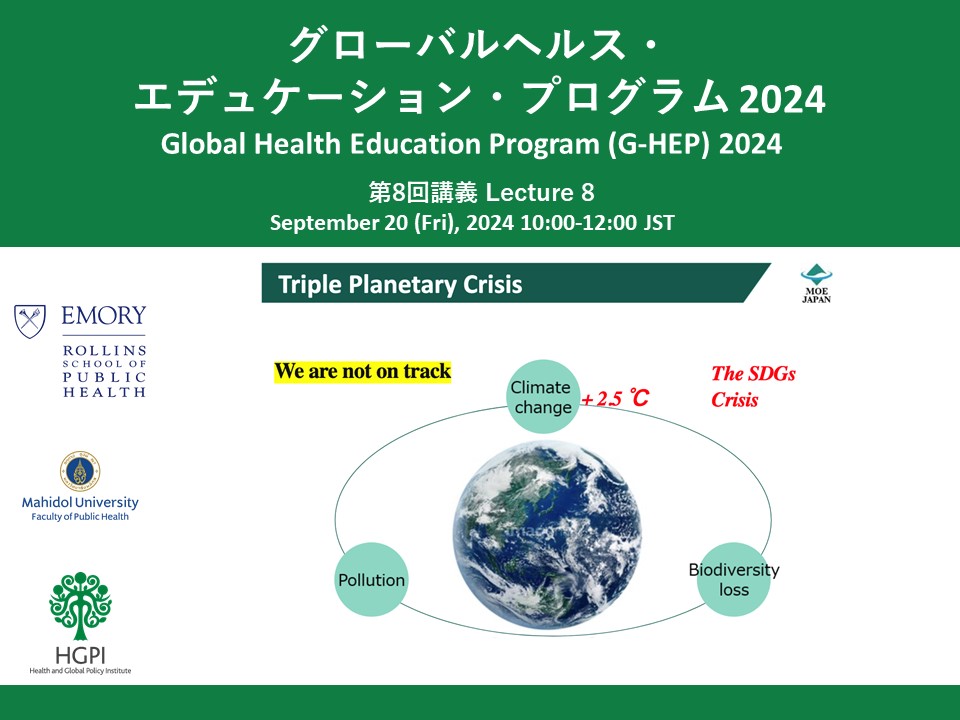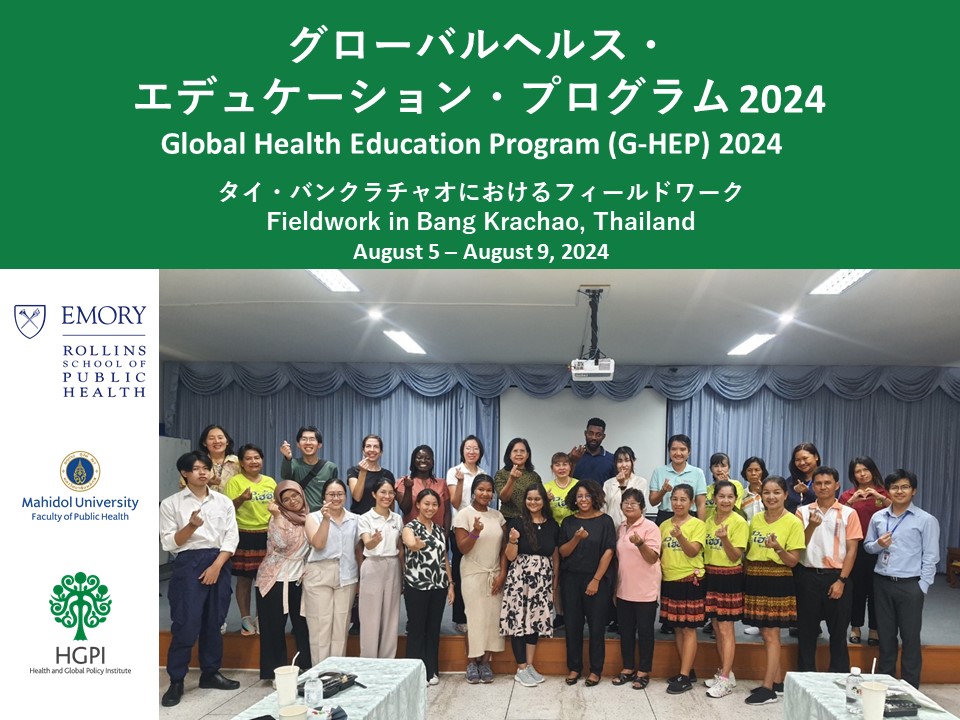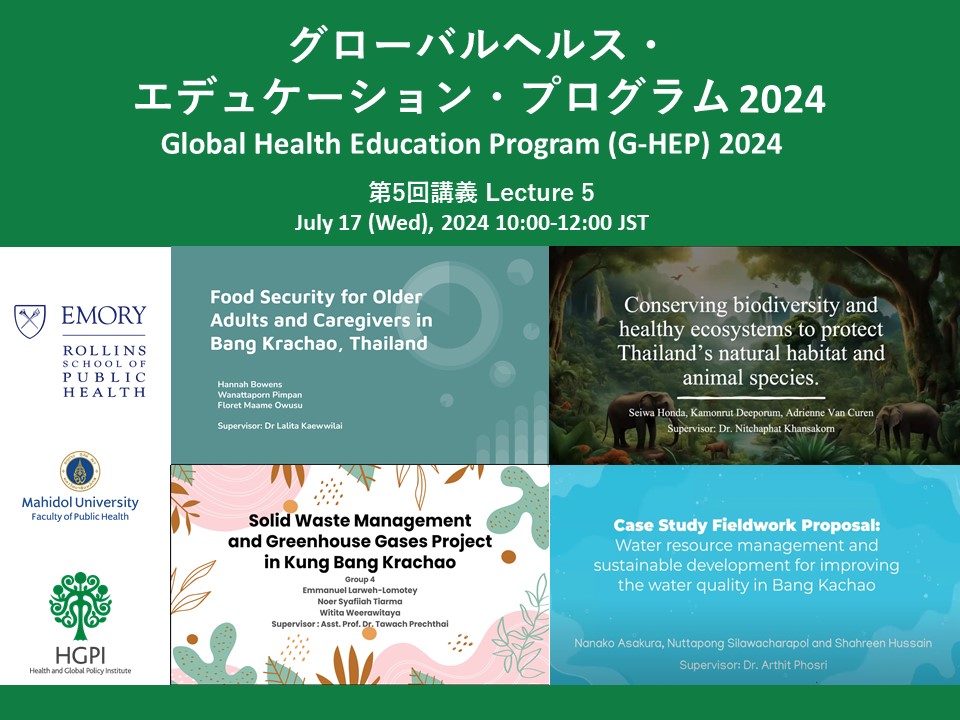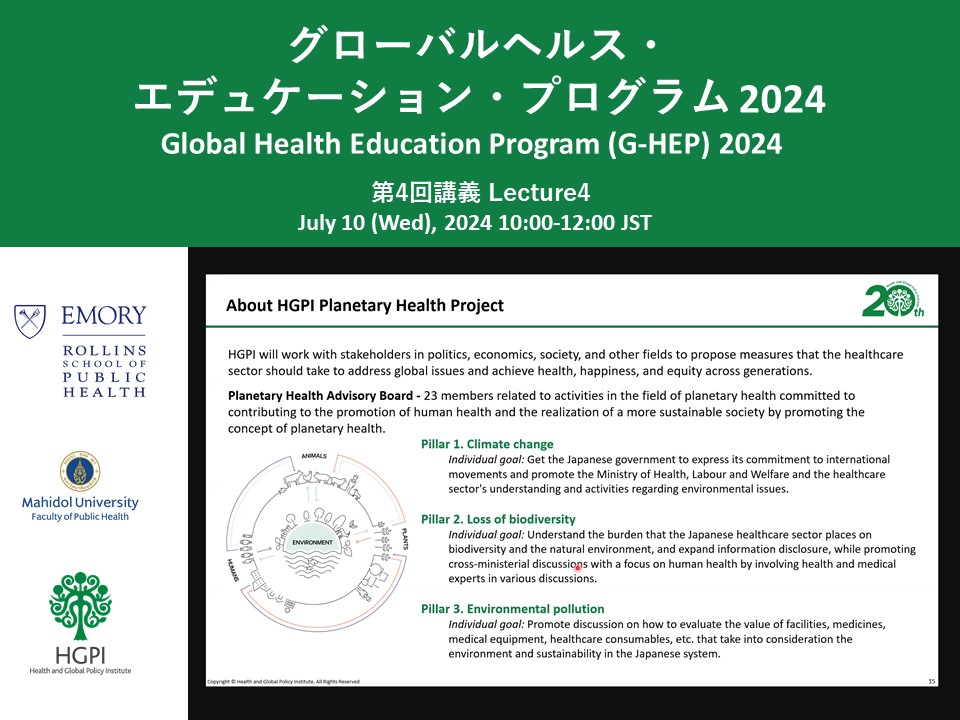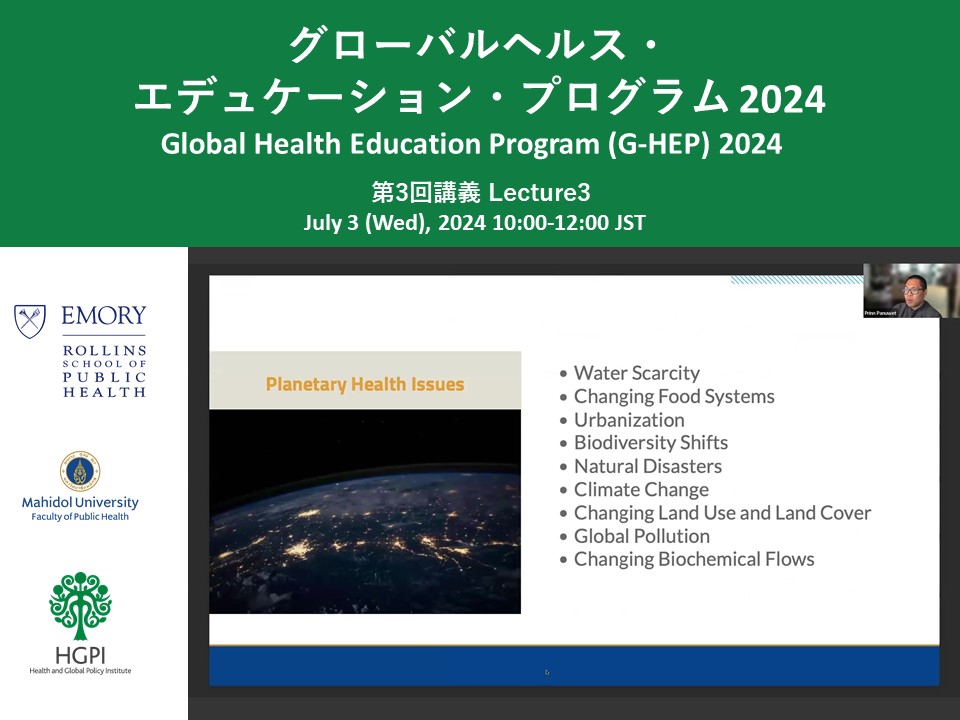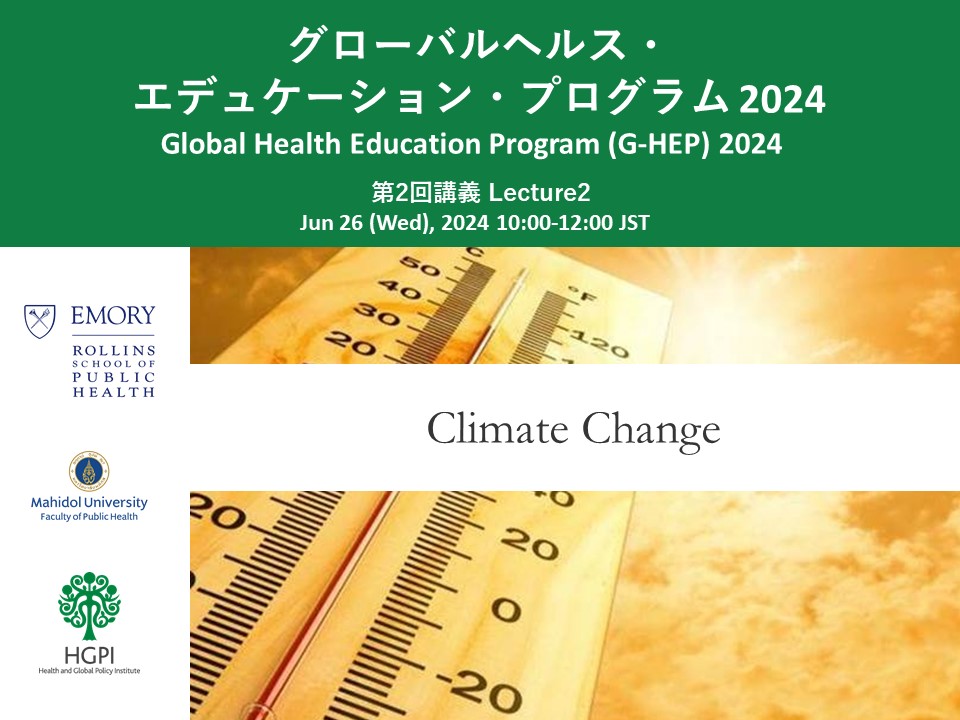[Event Report] Global Health Education Program (G-HEP) 2024 – Final Presentations and Policy Recommendations (November 29, 2024)
date : 2/6/2025
Tags: Global Health, Global Health Human Resources Development
![[Event Report] Global Health Education Program (G-HEP) 2024 – Final Presentations and Policy Recommendations (November 29, 2024)](https://hgpi.org/en/wp-content/uploads/sites/2/HGPI_20250206_G-HEP-policypaper_eyecatch.jpg)
The 2024 Global Health Education Program (G-HEP) concluded in Tokyo, Japan, where 12 participants from Japan, Thailand, and the United States came together for the final field and activities, which took place in Hiroshima, and to finalize and present their case study findings and policy proposals. This year’s G-HEP was organized with Health and Global Policy Institute (HGPI), the Faculty of Public Health at Mahidol University in Thailand, and the Rollins School of Public Health at Emory University in the United States (U.S.).
This program theme, “Fostering multilateral collaboration among young leaders to address planetary health challenges,” took place over 6 months where multicultural and multidisciplinary participants participated in online lectures, group work on case study topics, and fieldwork in Thailand and Japan.
The program concluded with participants making a final presentation of their case study findings from the field and their solutions and policy recommendations to a panel of experts working in global health and policy.
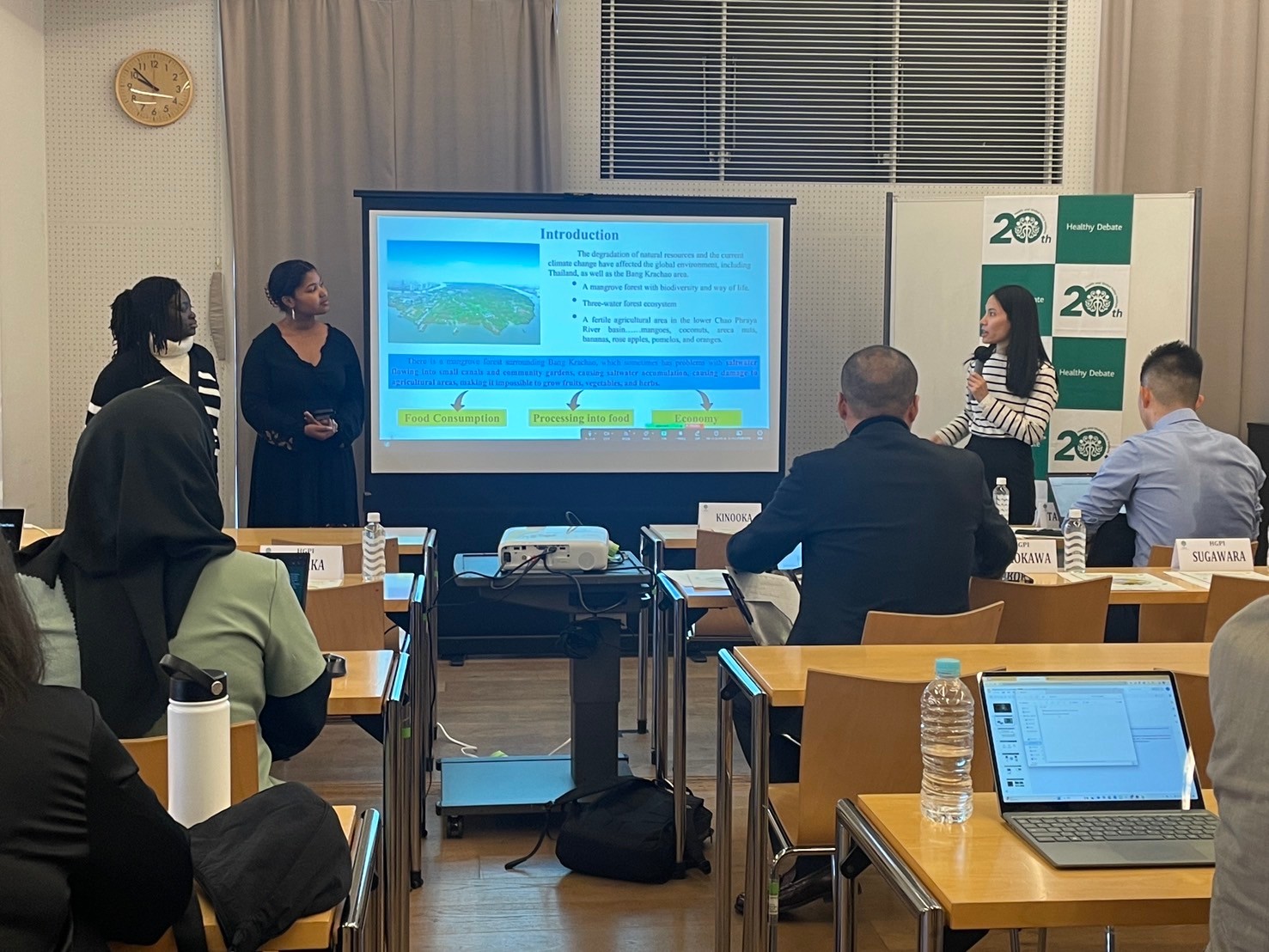 |
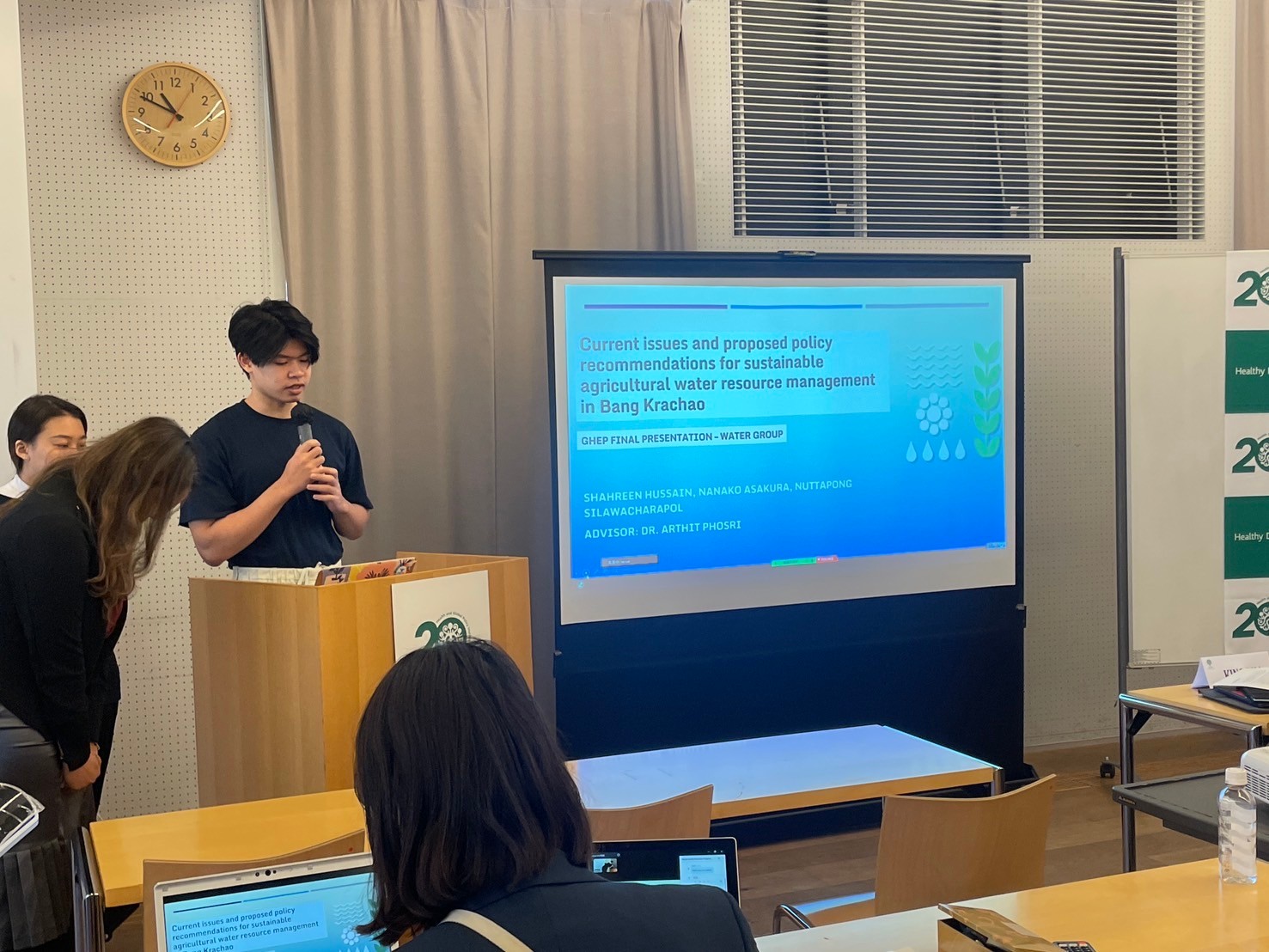 |
Each group delivered final presentations on the following four case study topics along with a policy paper that was submitted, a summary of the key findings are highlighted from each group.
<Case study results and policy recommendations on each topic by G-HEP participants>
1. Food security under a changing climate: Exploring the adaptation strategies for Thai older adults and caregivers in sub-urban communities
The study highlights critical challenges in food security for older adults in Thailand, driven by limited resources, climate change impacts such as saltwater intrusion, and systemic gaps in nutrition programs and sustainable agriculture policies. Despite strong community support, older adults remain vulnerable due to these deficiencies.
Key recommendations:
-
- Promote sustainable agriculture to enhance food availability and resilience against environmental challenges.
- Empower communities and individuals through education and localized support systems.
- Implement targeted health initiatives that link non-communicable disease management with improved nutrition access.
2. Conserving biodiversity and healthy ecosystems to protect Thailand’s natural habitat and animal species
The study identifies gaps in cohesive strategies for long-term biodiversity preservation in Bang Krachao despite promising efforts like the Our Khung Bang Krachao project and firefly conservation initiatives. Challenges include unintended consequences of the Land and Buildings Tax Act (2019), a lack of coordination in waste and water management systems, and governance inefficiencies.
Key recommendations:
-
- Launch a public awareness campaign to address biodiversity and conservation following tax modifications.
- Develop ecological corridors1 to mitigate habitat fragmentation.
- Strengthen community-based conservation with targeted outreach, particularly to the caregiver generation.
- Establish a unified oversight committee comprising local leaders and conservation experts to monitor progress and adapt policies.
- Leverage international partnerships for technical and financial support.
- Integrate technological tools, such as remote sensing, for biodiversity monitoring while engaging grassroots communities.
1 Ecological corridors connect wildlife habitats and creates space for wildlife to move and disperse.
3. Water resource management and sustainable development for improving the water quality in Samut Prakan
The study highlights critical challenges faced by local farmers in managing water resources and sustaining agricultural practices in the face of rising salinity levels, inadequate groundwater access, and fragmented water management. Farmers currently rely on informal methods to assess water quality due to the lack of affordable tools and institutional support. Rising sea levels and damaged water gates further exacerbate these issues, negatively affecting crop yields and soil fertility.
Key Recommendations:
-
- Establish a centralized water management organization to improve coordination, provide real-time water quality data, and facilitate collaboration among stakeholders.
- Support sustainable farming practices by distributing resources such as High Density Polyethylene (HDPE) geomembrane sheets2 and salinity testing kits at reduced costs to assist farmers.
- Enhance data collection and sharing through partnerships between farmers, local governments, and universities to create a shared database for informed policymaking and water quality monitoring.
- Integrate Climate-Smart Agriculture (CSA)3 practices by promoting salt-tolerant crops and building resilience to climate impacts.
2 HDPE geomembrane sheets are a type of waterproof material that prevents water from seeping in and evaporating as a mitigation method from being polluted.
3 Climate-smart agriculture (CSA) is an integrated approach to managing landscapes—cropland, livestock, forests and fisheries–that address the interlinked challenges of food security and climate change (World Bank).
4. Tackling Thailand’s mismanaged solid and plastic waste problem
The study underscores the significant environmental challenge of plastic waste in Thailand, which ranks sixth globally for plastic waste release. Kung Bang Krachao, a vital green space and popular tourist destination, is heavily impacted by visitor-generated waste. Despite its ecological importance, current waste management systems lack tourist involvement and effective initiatives to address the issue.
Key Recommendations:
-
- Implement the polluter-pays principle (PPP) to hold waste generators accountable.
- Promote refillable systems to reduce single-use plastics.
- Engage stakeholders through corporate social responsibility (CSR) programs to support waste reduction.
- Encourage behavioral changes by offering incentives, such as discounts for eco-friendly practices.
- Introduce programs for renting or selling reusable food containers to tourists.
- Install water dispensers to reduce bottled water consumption.
Full abstracts from each group’s policy paper can be read below.
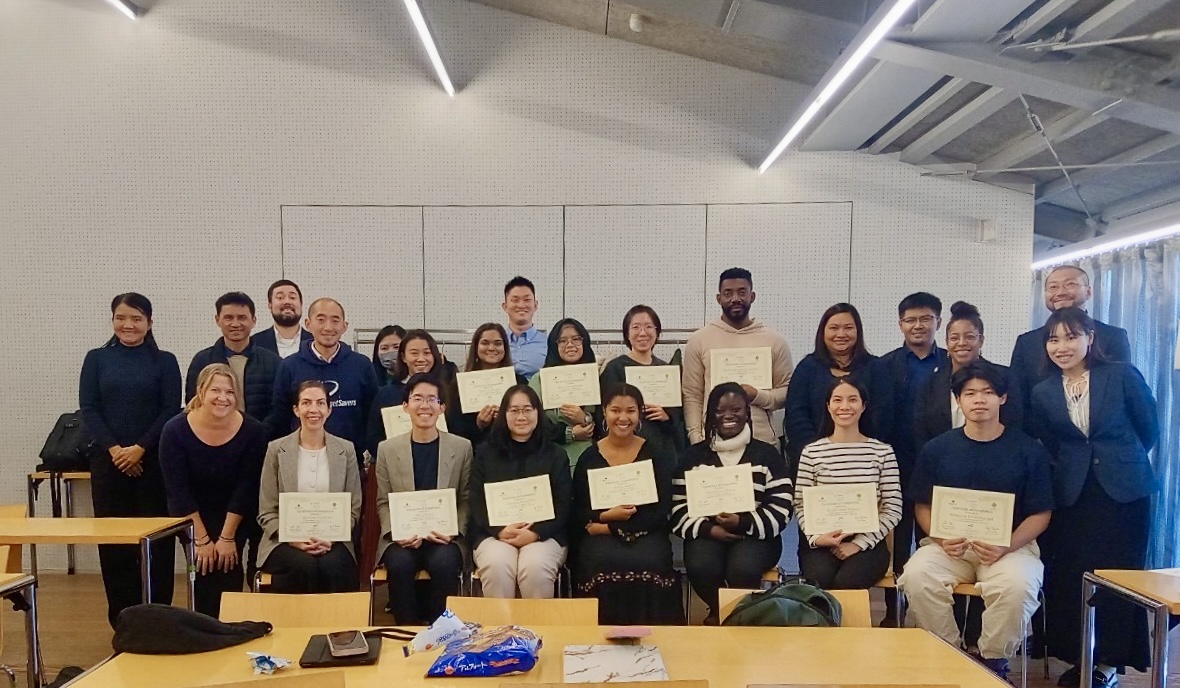
Participants in the G-HEP 2024 cohort learned about the intersection of climate change, demographic shifts, and urbanization with health, agriculture, and sustainability challenges. They gained insights into creating targeted, multi-level interventions combining policy, community empowerment, and technological innovation to address these issues effectively. They emerged as empowered young leaders, ready to tackle pressing planetary health challenges with collaboration, innovative strategies, and transformative solutions that drive sustainable impact.
<G-HEP Guest Speakers> (Titles omitted, in no particular order, titles are at the time of presentation)
Sarawut Thepanondh (Dean of Faculty of Public Health, Mahidol University)
Noah Scovronick (Assistant Professor, Gangarosa Department of Environmental Health, Rollins School of Public Health, Emory University)
Parinya Panuwet (Research Assistant Professor, Gangarosa Department of Environmental Health, Rollins School of Public Health, Emory University)
Joji Sugawara (Vice President, Health and Global Policy Institute)
Koki Takaki (Director of the Office of Mercury and International Chemicals Management in the Environmental Health Department, Ministry of the Environment, Japan)
Robin Takashi Lewis (Co-CEO, Social Innovation Japan / Co-founder, mymizu)
Saori Kashima (Associate Professor in PHIS at The IDEC Institute, Hiroshima University)
Sonoko Watanabe (Associate Professor in PHIS at The IDEC Institute, Hiroshima University)
Katsunobu Shirakawa (Curator of the Nature Museum of Geihoku Highlands and Deputy Director of Noboribetsu City Tourism Exchange Center)
Tamaki Toujyou (Director, Kitahiroshima-cho Ogahara Clinic)
Jeffrey Hart (Public Relations Office Chief, Radiation Effects Research Foundation)
Tove Kinooka (Director & Co-Founder, Enteleco)
Kei Ikegami (CEO, Planet Savers, Inc.)
Masamitsu Takamatsu (Researcher, National Institute of Infectious Diseases)
This project is supported by local businesses and residents of Bang Krachao, Thailand, and members of the Geihoku Sedoyama Project in Hiroshima Prefecture, Japan, as well as many other contributors.
■ About Global Health Education Program (G-HEP)
The “Global Health Education Program (G-HEP)” vision is to establish a global community of young leaders that can work together to push global health agendas forward and to conduct human resources training and development for the future. The partnership with the Mahidol University Faculty of Public Health which began in 2018 extended the program’s boundaries through interactions among young generations not only from Japan but from the ASEAN region as well. This year’s program welcomes Emory University Rollins School of Public Health bringing a U.S. perspective to the program along with participants of diverse professions and backgrounds. Participants in G-HEP can work together to deepen mutual understanding and cooperation for solving complex global public health issues.
■ About The Rollins School of Public Health at Emory University
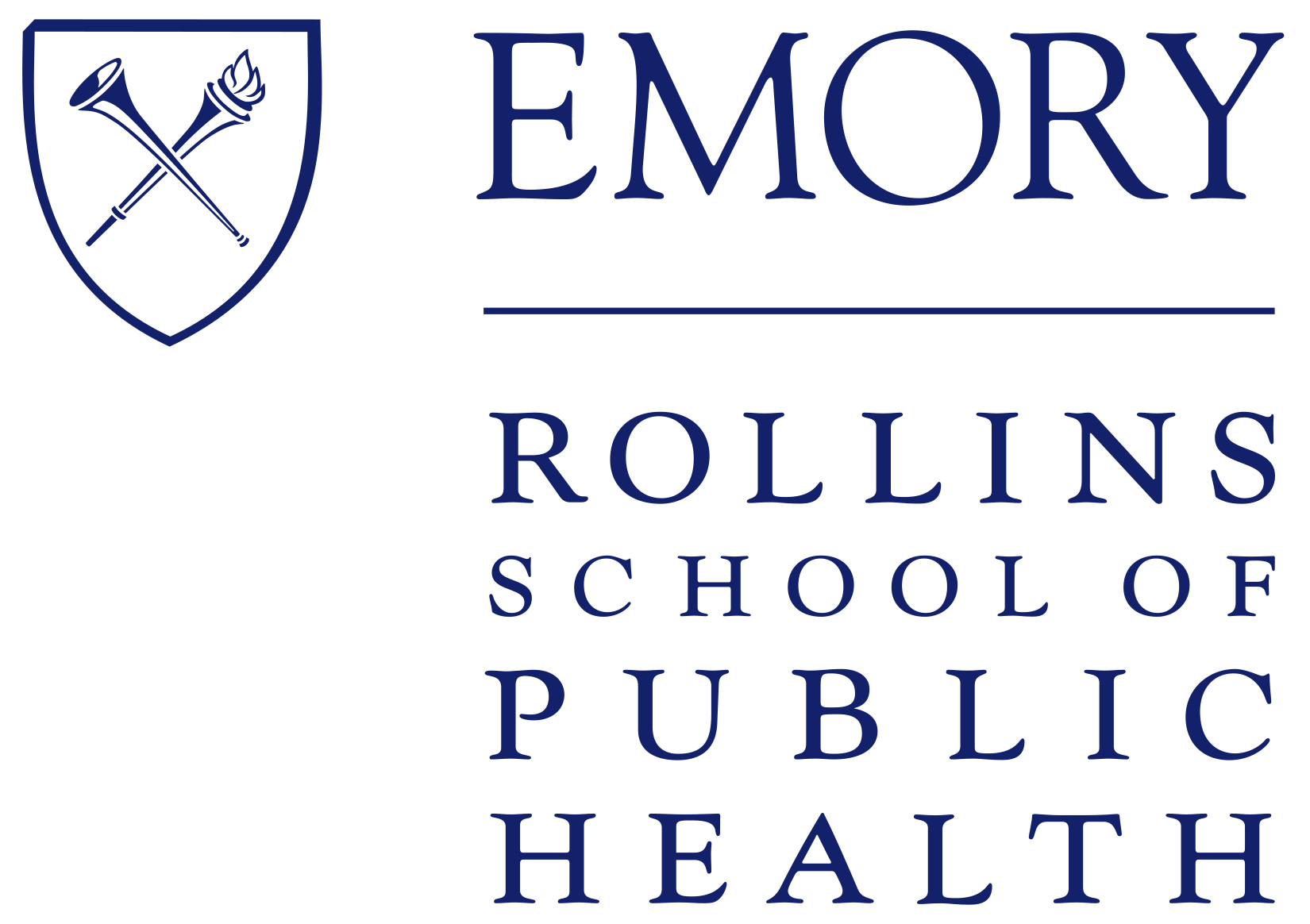 The Rollins School of Public Health at Emory University is ranked 3rd among all accredited schools and programs of public health in the United States. Located in Atlanta, known as the “Public Health Capital of the World,” the school draws strength from several unique local resources. The U.S. Centers for Disease Control and Prevention provides many of the school’s nearly 200 adjunct faculty. The Carter Center is involved in international health intervention programs that provide student practicum opportunities. Students can learn from both in the classroom and as interns in the field. Students join the Rollins community from all 50 states and from more than 40 foreign countries to contribute to the school and apply knowledge to promote health and prevent disease in human populations.
The Rollins School of Public Health at Emory University is ranked 3rd among all accredited schools and programs of public health in the United States. Located in Atlanta, known as the “Public Health Capital of the World,” the school draws strength from several unique local resources. The U.S. Centers for Disease Control and Prevention provides many of the school’s nearly 200 adjunct faculty. The Carter Center is involved in international health intervention programs that provide student practicum opportunities. Students can learn from both in the classroom and as interns in the field. Students join the Rollins community from all 50 states and from more than 40 foreign countries to contribute to the school and apply knowledge to promote health and prevent disease in human populations.
■ About The Faculty of Public Health at Mahidol University
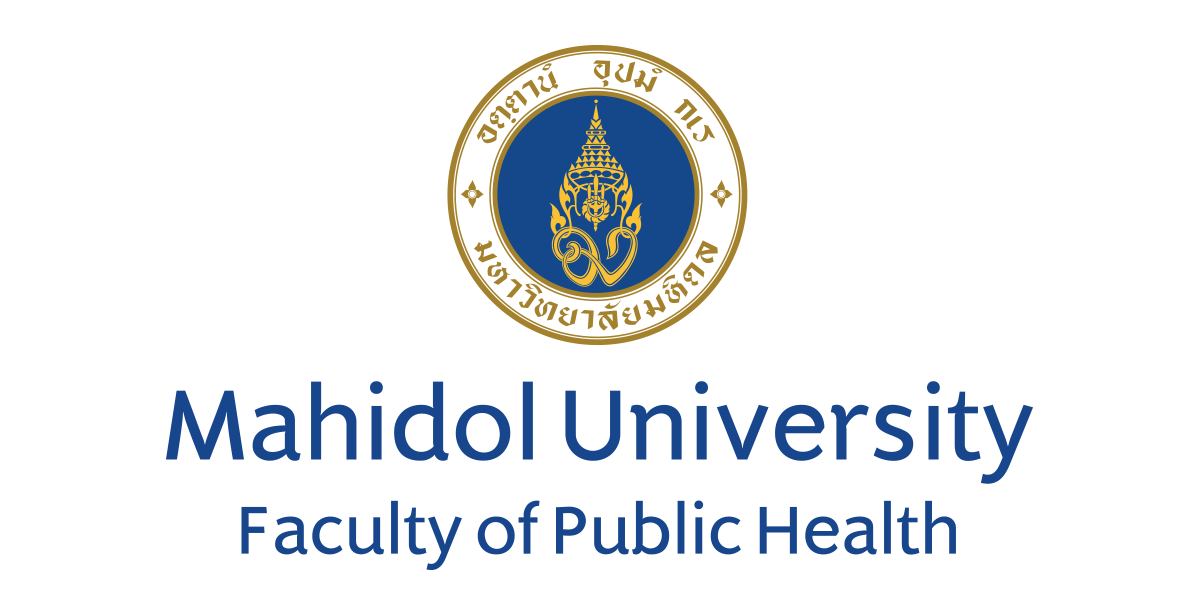 The Faculty of Public Health at Mahidol University, established in 1948 is the first public health academic institution in Thailand. At present, the Faculty of Public Health produces approximately 1,400 graduates in several majors from the Bachelor, Masters, and Doctoral levels. The faculty plays an integral role as an academic leader in the Asia-Pacific region, contributing to the development of the country on academic management, training, as well as academic service to Asia-Pacific countries. Since 1976, the faculty has been running the Master of Public Health – International Program, with over 1250 graduates from 42 different countries.
The Faculty of Public Health at Mahidol University, established in 1948 is the first public health academic institution in Thailand. At present, the Faculty of Public Health produces approximately 1,400 graduates in several majors from the Bachelor, Masters, and Doctoral levels. The faculty plays an integral role as an academic leader in the Asia-Pacific region, contributing to the development of the country on academic management, training, as well as academic service to Asia-Pacific countries. Since 1976, the faculty has been running the Master of Public Health – International Program, with over 1250 graduates from 42 different countries.
 This project is supported by The Japan Foundation.
This project is supported by The Japan Foundation.
Top Research & Recommendations Posts
- [Research Report] The 2025 Public Opinion Survey on Healthcare in Japan (March 17, 2025)
- [Policy Recommendations] Cancer Control Project “Policy Recommendations on Addressing Regional Disparities in Breast Cancer Care” (January 31, 2025)
- [Research Report] The 2023 Public Opinion Survey on Satisfaction in Healthcare in Japan and Healthcare Applications of Generative AI (January 11, 2024)
- [Policy Recommendations] Developing a National Health and Climate Strategy for Japan (June 26, 2024)
- [Research Report] Building a Mental Health Program for Children and Measuring its Effectiveness (June 16, 2022)
- [Policy Recommendations] Achieving a Sustainable Society of Health and Longevity Through the Integration of Environment and Healthcare-Incorporating a Planetary Health Perspective into the 3rd Phase of The Healthcare Policy-(December 20, 2024)
- [Policy Recommendations] Dementia Project Information Packet for Local Government Officials “Dementia Policies for Our City: Taking the First Step in Promoting Future Measures for Dementia” (March 17, 2025)
- [Public Comment Submission] “GX2040 Vision (Draft)” (January 26, 2025)
- [Policy Recommendations] Obesity Control Promotion Project 2023 “The Next Steps for Engaging and Cooperating with Patients, Citizens, and Communities for Implements of Obesity Control Measurements” (April 8, 2024)
- [Public Comment Submission] “Third Phase of The Healthcare Policy (Draft)” (February 3, 2025)
Featured Posts
-
2025-03-24
[HGPI Policy Column] (No.57) From the Dementia Project “The Future of Dementia Research Co-created with Lived Experience, Vol.2: Person-Centered Care Approach and Patient and Public Involvement: A Best Practice Example from Sweden”
![[HGPI Policy Column] (No.57) From the Dementia Project “The Future of Dementia Research Co-created with Lived Experience, Vol.2: Person-Centered Care Approach and Patient and Public Involvement: A Best Practice Example from Sweden”](https://hgpi.org/en/wp-content/uploads/sites/2/HGPI_202503_Person-centered-care-approach-and-Patient-and-Public-Involvement_-A-Best-Practice-Example-from-Sweden.jpg)
-
2025-03-26
[Registration Open] (Webinar) The 132nd HGPI Seminar “Considering the Ideal Evidence-Based Immunization and Vaccination Policies” (April 25, 2025)
![[Registration Open] (Webinar) The 132nd HGPI Seminar “Considering the Ideal Evidence-Based Immunization and Vaccination Policies” (April 25, 2025)](https://hgpi.org/en/wp-content/uploads/sites/2/hs132-top.png)
-
2025-03-28
[Policy Recommendations] Cancer Control Project “Policy Recommendations on Addressing Regional Disparities in Breast Cancer Care” (January 31, 2025)
![[Policy Recommendations] Cancer Control Project “Policy Recommendations on Addressing Regional Disparities in Breast Cancer Care” (January 31, 2025)](https://hgpi.org/en/wp-content/uploads/sites/2/Policy-Recommendations-on-Addressing-Regional-Disparities-in-Breast-Cancer-Care-top.jpg)
-
2025-03-31
[Event Report] The 125th HGPI Seminar “Progress and Prospects for Domestic Measures on Health Problems Caused by Alcohol” (May 24, 2024)
![[Event Report] The 125th HGPI Seminar “Progress and Prospects for Domestic Measures on Health Problems Caused by Alcohol” (May 24, 2024)](https://hgpi.org/en/wp-content/uploads/sites/2/HGPI_20240524_125thHGPIseminar_Eyecatch_rev-1.jpg)
-
2025-04-02
[Registration Open] Public Event “The Patient and Citizen Lived Experience Forum 2025” (May 17, 2025)
![[Registration Open] Public Event “The Patient and Citizen Lived Experience Forum 2025” (May 17, 2025)](https://hgpi.org/en/wp-content/uploads/sites/2/HGPI_20250517_PeoplewithLivedExperienceForum2025-.jpg)




